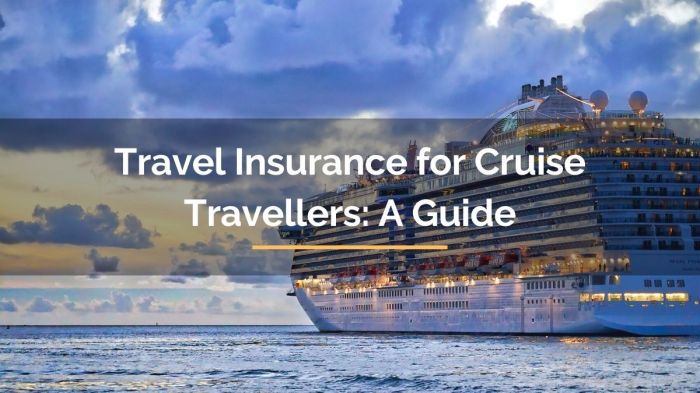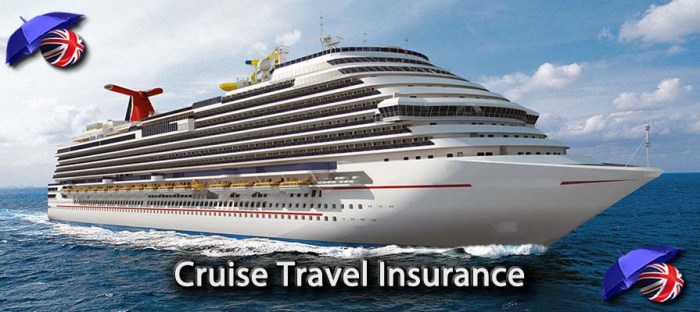Cruise travel insurance policies explained takes center stage in this detailed guide, offering insights into the intricacies of coverage and limitations. Delve into the world of cruise-specific insurance with a mix of clarity and depth.
As we navigate through the nuances of cruise travel insurance policies, understanding key coverage areas, exclusions, and how to choose the right policy becomes paramount for a worry-free travel experience.
Overview of Cruise Travel Insurance Policies

When planning a cruise vacation, it’s essential to consider getting cruise travel insurance to protect yourself from unforeseen events that may disrupt your trip. Cruise travel insurance provides coverage specifically tailored to the unique aspects of cruising.
If you’re in the market for a new car and value advanced technology, luxury sedans are the way to go. From cutting-edge infotainment systems to state-of-the-art safety features, these vehicles offer the best of both worlds. Discover more about luxury sedans with advanced technology in this article: Luxury sedans with advanced technology.
Purpose of Cruise Travel Insurance, Cruise travel insurance policies explained
- Coverage for trip cancellation or interruption due to unexpected events such as illness, injury, or death.
- Reimbursement for medical expenses incurred while on a cruise ship or at a port of call.
- Compensation for lost, damaged, or delayed luggage.
- Emergency evacuation and repatriation coverage in case of a medical emergency.
- 24/7 assistance services for travel-related emergencies.
Importance of Cruise-Specific Insurance
While regular travel insurance may provide some coverage for trips, cruise-specific insurance offers additional benefits that cater to the unique circumstances of cruising. Cruise travel insurance typically includes coverage for missed port departures, itinerary changes, and onboard medical services, which are not usually covered by standard travel insurance policies.
When it comes to road safety, one of the best investments you can make is installing a car dash cam. Not only does it provide evidence in case of accidents, but it also promotes safer driving habits. Check out this article on the Advantages of installing a car dash cam for safety to learn more.
Key Coverage Areas
When it comes to cruise travel insurance policies, there are specific coverage areas that are typically included to ensure travelers are protected throughout their journey. Let’s explore the key coverage areas and compare them to regular travel insurance.
Trip Cancellation
Trip cancellation coverage in cruise travel insurance policies typically reimburses travelers for non-refundable expenses if they have to cancel their trip due to unforeseen circumstances such as illness, injury, or a death in the family. This coverage can also apply if the cruise line cancels the trip for reasons beyond the traveler’s control.
Medical Emergencies
Medical emergencies coverage is crucial for cruise travel insurance as it provides assistance and coverage for medical treatment while on the cruise ship or at a port of call. This can include emergency medical evacuation to a hospital or repatriation back home for further treatment.
Lost Luggage
Lost luggage coverage helps travelers in the unfortunate event that their belongings are lost, stolen, or damaged during the cruise. This coverage can help reimburse travelers for the value of their lost items, allowing them to replace essential belongings.
Comparison with Regular Travel Insurance
While regular travel insurance may offer similar coverage areas like trip cancellation, medical emergencies, and lost luggage, cruise travel insurance policies are tailored to the specific needs and risks associated with cruising. For example, cruise travel insurance may include coverage for missed port departures, itinerary changes, or onboard medical services that regular travel insurance may not cover.
Scenarios
– Trip Cancellation: If a traveler falls ill before their cruise departure date and needs to cancel the trip, trip cancellation coverage can help reimburse the non-refundable expenses.
– Medical Emergencies: In the event of a medical emergency while on the cruise, medical emergencies coverage can ensure the traveler receives necessary medical treatment without worrying about hefty medical bills.
– Lost Luggage: If a traveler’s luggage goes missing during the cruise, lost luggage coverage can help cover the cost of replacing essential items, ensuring a smoother travel experience.
Exclusions and Limitations: Cruise Travel Insurance Policies Explained

When it comes to cruise travel insurance policies, it’s important to be aware of the exclusions and limitations that may affect your coverage. Understanding these key aspects can help you make informed decisions and ensure you have the protection you need while traveling.
While cruise travel insurance policies vary by provider, there are some common exclusions and limitations that you may encounter. Here are a few important points to consider:
Common Exclusions and Limitations
- Pre-existing medical conditions: Many cruise travel insurance policies may exclude coverage for pre-existing medical conditions. This means that if you have a medical condition that existed before you purchased the policy, any related issues may not be covered.
- Extreme activities: Some policies may not cover participation in certain high-risk activities such as scuba diving, bungee jumping, or skydiving. It’s important to check the policy details to ensure you are covered for any activities you plan to engage in during your cruise.
- Unapproved destinations: Make sure to check if your cruise travel insurance policy covers all the destinations on your itinerary. Some policies may exclude coverage for countries with travel advisories or those considered high-risk.
Scenarios Where Coverage May Be Limited
- If you exceed the maximum trip duration allowed by the policy, your coverage may be limited or not applicable. It’s crucial to review the policy details to understand the duration restrictions.
- In cases where the cruise line is responsible for a disruption or cancellation, your insurance coverage may be limited. This is because cruise lines typically have their own policies for compensating passengers in such situations.
Ensuring Adequate Coverage
- Read the policy documents carefully: To ensure you are adequately covered despite the exclusions and limitations, it’s essential to carefully read and understand all the terms and conditions of your cruise travel insurance policy.
- Consider add-on coverage: Depending on your specific needs and concerns, you may want to consider purchasing additional coverage or riders to supplement your existing policy and fill any gaps in coverage.
- Consult with a travel insurance expert: If you have any doubts or questions about your coverage, don’t hesitate to seek advice from a travel insurance expert who can provide guidance on how to maximize your protection while cruising.
Choosing the Right Policy
When it comes to selecting the best cruise travel insurance policy for your individual needs, there are several key factors to consider. Here is a step-by-step guide on how to choose the right policy based on your specific requirements.
Step-by-Step Guide
- Start by assessing your travel plans, including the duration of your cruise, the destination you will be visiting, and the activities you have planned.
- Research different insurance providers and compare their policies in terms of coverage, limits, and exclusions.
- Consider the level of medical coverage offered, especially if you have pre-existing medical conditions or require specific medications.
- Look for policies that include coverage for trip cancellations, interruptions, or delays, as well as coverage for lost or delayed baggage.
- Check if the policy includes emergency medical evacuation and repatriation coverage, particularly if you will be traveling to remote destinations.
- Review the policy’s exclusions and limitations to ensure it meets your specific needs and provides adequate coverage for any unforeseen circumstances.
Factors to Consider
- Trip Duration: Choose a policy that aligns with the length of your cruise to ensure you are covered for the entire duration of your trip.
- Destination: Consider the specific risks associated with your cruise destination and select a policy that provides coverage for those risks.
- Activities Planned: If you will be engaging in high-risk activities during your cruise, make sure the policy includes coverage for those activities to avoid any potential gaps in coverage.
Conclusive Thoughts

In conclusion, Cruise travel insurance policies explained sheds light on the essential aspects of securing adequate coverage for your cruising adventures. With a wealth of information at your fingertips, embark on your next voyage fully prepared and informed.